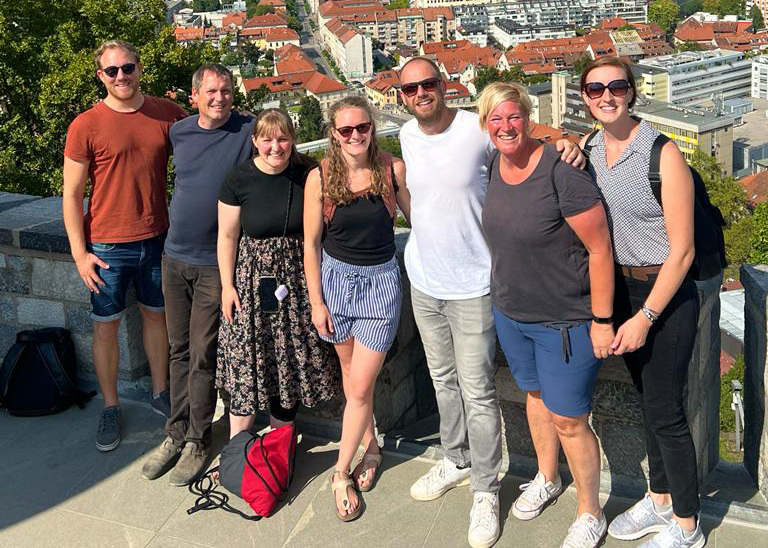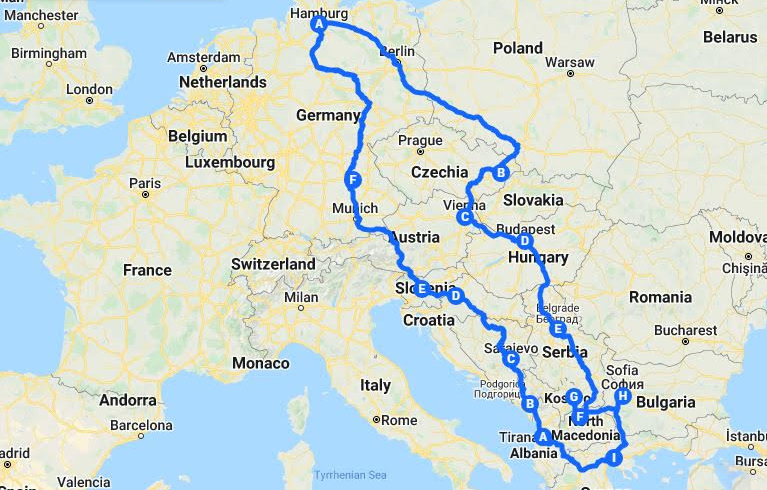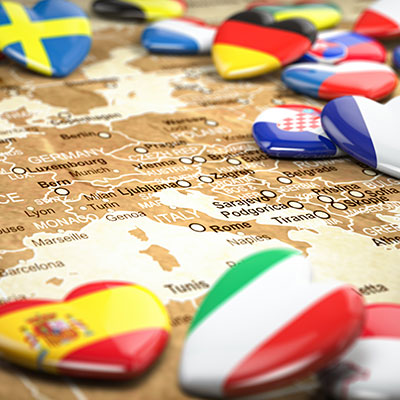Six years ago, Evi Rodemann was visiting friends in South Africa. Her friends had recently travelled around the continent in a van, strengthening church leaders along their journey.
Inspired by their example, Evi returned to Germany and began thinking about what she could do to bless leaders in Europe, especially in the Balkan region. Many of her friends there were exhausted from the Covid-19 pandemic and feeling discouraged.
Evi Rodemann is the chair of groups and gatherings for the Lausanne Younger Leaders Generation (YLGen), director of LeadNow, and an associate congress director for Seoul 2024. This past summer, she decided to bring together a team to make her Balkan dream a reality.
From 23 July to 12 August 2022, Evi and her team traversed many border crossings and long days in a van, all in the name of encouraging, strengthening, and blessing young leaders throughout the Balkans. In just 21 days, they personally visited 205 leaders in 15 nations, traveling a total of over 6,000 kilometers.
The Balkans is a beautiful and diverse region of Europe, which includes countries like Albania, Bosnia, Kosovo, Croatia, and Greece. It is often overlooked both as a mission field and as a mission resource.

The team (from left to right): Tim Engelmann, André Springhut, Kirsy Rodemann, Leah Timmermann, Heiko Simmer, Evi Rodemann, Lexie Newsom
Despite its war-torn history and continued conflicts, the team was struck by the resilience and faithfulness of the Balkan Christian leaders. Evangelical Christians in the Balkan region are primarily first-generation, and many of the churches the team visited are the first evangelical church plants in the country, where growth has been very slow. Over the course of the pandemic, leaders felt as though the long months of gatherings restrictions and isolations had snatched away the harvest, one that was painstakingly grown through years of ploughing in seemingly barren fields.
‘I long to see you, that I may impart to you some spiritual gift to strengthen you,’ writes the Apostle Paul in Romans 1:11. Similarly, Evi wanted to remind the Balkan believers that those who sow in tears will reap with songs of joy. She wanted to encourage them not to grow weary in doing good, for at just the right time they will reap a harvest of blessing if they do not give up. She wanted to remind them that fruit in the kingdom cannot be measured in numbers.

The route from Hamburg to Greece, and back again.
The team, which included social workers, pioneers, artists, missionaries, and students, planned out the route. They started in Hamburg, went through the Czech Republic, down towards Greece, and then followed another route back along the coastline. In each of the fifteen countries, they planned stops to encourage old friends and make new ones.
As plans started to fall into place, they had one major hurdle—no vehicle. A rental car would not work, since insurance did not permit them to travel to the Balkan region, so for months they searched for an alternative.
When they had exhausted all options and were wondering about the feasibility of the trip, a prayer house leader in Eastern Germany heard about the tour and gifted them a van, which was perfect for the tour. It had even been printed with the details of the trip.

The van itself was a message of encouragement especially as they travelled through the Czech Republic, known as the most atheistic nation in the world, as well as areas which are 98 percent Muslim.
Stories from the Road
One night the team was in the van crossing a bridge from Kosovo to Serbia, praying for peace and reconciliation between these two nations. An hour later riots broke out on the bridge they had just driven over and the roads were blocked, meaning they had to take a two-hour detour just to be safe.
‘We drove away and left the tensions behind us,’ says Evi. ‘But how different it is for everyone else who lives there, and not only there, but in many of these nations where tensions exist.’
In Slovenia, which has one of the highest suicide and depression rates in Europe, the team met a lady who came from a troubled background, where at age seven she had wanted to commit suicide. Later, when she became a Christian, her Muslim dad stopped talking to her and told her she was no longer his daughter. Despite the pressures and persecutions she faced, she persevered in her faith and is now completing her PhD in theology while being employed by a European mission organisation, and is involved in reaching her community.
In Albania they met up with a Roma couple who pleaded with them to come and see them, saying, ‘You’re the first ones ever who just come to be with us and just hang out with us.’ Normally they are either bypassed because they aren’t in the capital or they are visited for a ministry-related reason. Simply celebrating God’s goodness together and spending time hearing one another’s stories was the encouragement that this Roma couple needed.
A lot of the time the team just spent visiting, listening, and sharing meals together with leaders in the region, rather than bringing answers or solutions. The need for collaboration and connecting leaders is especially high in this region where there are so few Christians and many of them feel isolated and lonely.
The need for collaboration and connecting leaders is especially high in this region where there are so few Christians and many of them feel isolated and lonely.
‘One of the leaders we met told us, “People only come once to visit us and tick it off the list.” What these leaders really need is our friendship and to know they are not alone,’ says Evi.
The country of Montenegro has 750,000 people but only around 250 known evangelicals. Evi and her team met with one leader who moved to Montenegro at age 23 to plant a church. Over the years, he has remained faithful to his church plant and stayed, despite slow growth and little support. There are now seven churches in Montenegro. When this young leader was first called there, there had been none.

A meal the team shared with church leader Daniel in Bar, Montenegro.
A Faith Refined by Fire
In the spirit of the Apostle Paul, the team chose not to be a burden to anyone, but raised funds for accommodation and food and even made donations to those in need as they went. The idea was to not only be a blessing spiritually, but to meet physical needs as well and learn where future needs might be.
‘While the physical needs are great, I believe that there’s an ever greater need. The voices of Balkan Christian leaders need to be heard and their stories need to be told,’ says Evi. ‘There’s a need for them to feel seen and heard by the global church, not only in terms of the needs they have, but also in terms of their contribution to the global church.’
These leaders demonstrate a visible tenacity and remain faithful to the calling they have received despite facing numerous challenges which are foreign to the rest of Europe.
Amidst the great need of this region, there is also great opportunity.
Amidst the great need of this region, there is also great opportunity. Many of the churches are only a few years old and some of them are the first evangelical churches to exist in the nation. A lot of the countries also have very young populations. For example, in Kosovo, 70 percent of the population is under the age of 35. Most of the leaders the team met had become Christians as children, and it is often the young people who are open to exploring the ideas of Christianity. However, there is a real lack of ministry for children and youth. Kosovo only has about 24 churches, of which 80 percent don’t have any children’s or youth ministry.
Article
The Extraordinary Re-Evangelization of Europe
Will European churches wake up to what God is doing across the continent? The future of Europe depends on it.
What struck Evi most about the Balkan region is the unconditional love of the leaders for God, and their unconditional love and passion for building his kingdom.
‘Despite growth being slow and hard, and having limited resources, the faith of Balkan believers rises beyond the challenges of their circumstances,’ says Evi. ‘It is not a shallow faith, but it is one which has been refined by fire.’
The example of the Balkan believers is a calling for the global church to uphold them in prayer and rejoice over their faithfulness as they seek to advance the Great Commission in their corner of the world.
There is so much to learn from other nations.
‘There is so much to learn from other nations. The Balkan trip has opened my eyes to the unique ways sisters and brothers from other cultures love God dearly and wholeheartedly despite facing challenges we in western Europe can only imagine,’ she says.
Upon returning from the tour, Evi says they are both heart-warmed and heartbroken. They are encouraged by the testimonies shared, friends made, and faithfulness observed, but they are also heartbroken over the conflicts that continue, the needs that abound, and the feelings of neglect that are experienced by Christian leaders in the Balkans.
‘How can we listen to these nations so that they feel heard?’ asks Evi. ‘How can we learn from their surviving and even thriving amidst difficult situations? How can the global church be stirred to effectively provide a platform for these brothers and sisters to share both their needs as well as their victories?’
By listening intentionally to the voices of leaders in the Balkan region, the team was able to discern what the needs of these leaders are, rather than just assuming they knew what was needed. They were able to build relationships which are mutually beneficial and sustainable, instead of just donating resources and leaving.
Paul writes in 1 Thessalonians 2:8, ‘We cared so deeply that we were delighted to share with you not only the gospel of God, but our own lives as well. That is how beloved you have become to us.’
Similarly, Evi told her teammates at the end of the trip, ‘The relationship shouldn’t end when the trip ends.’ She challenged her teammates to each take one person from the trip and get back in touch with them, pray for them, or ask about ongoing needs.
‘In all our different cultures and different Christian expressions, the same God is worshipped,’ says Evi. ‘The power of the family of God serving together is extraordinary and only together can we build God’s kingdom and reach his people for Christ. This togetherness and unity in collaboration is also something I long to see through the Lausanne 4 journey and the upcoming Seoul 2024 congress.’
Pray with Us
By Evi Rodemann
Dear loving Jesus, the world is in turmoil and the Balkan region faces its own many tensions. May your will be done in this region and may there be thousands and thousands of people discovering the eternal peace in their hearts. May your body of Christ respond to the open doors, and may churches be awakened, refreshed, and newly planted.


